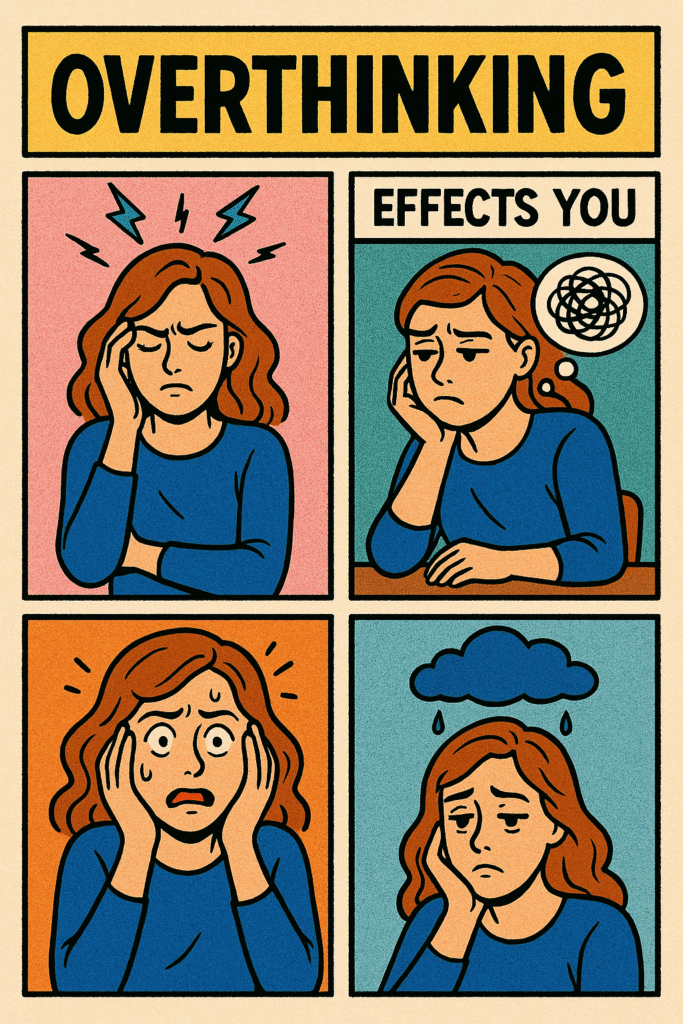We all think—it’s what the human brain does. But when thought turns into overthinking, a helpful process can become a harmful pattern. Overthinking is more than occasional worry or reflection; it’s a constant loop of uncertainty, analysis, and self-doubt. It not only drains your energy but also silently sabotages your mental well-being, relationships, and even physical health. In this post, we’ll dive into how overthinking impacts different areas of your life, and more importantly, how you can start breaking free from its hold.
The Mental Toll: When Your Mind Won’t Stop Running
Overthinking feeds anxiety, fuels over-analysis, and often leads to inaction. It traps you in an endless cycle of “what ifs” that lead nowhere. Instead of solving problems, your mind circles the same questions without resolution. Over time, this mental noise becomes overwhelming, contributing to:
- Chronic stress and anxiety
- Sleep disturbances
- Decreased ability to focus
- Low self-esteem and confidence
You start to mistrust yourself, second-guess decisions, and fear making choices—all because your mind refuses to shut off.
The Relationship Strain: Doubt, Distance, and Frustration
Overthinking doesn’t just affect you personally; it spills into your interactions with others. You might read too much into texts, replay conversations, or worry endlessly about how others perceive you. This can lead to:
- Miscommunication with partners, friends, or coworkers
- Jealousy or fear of abandonment
- Emotional distance because you’re in your head instead of being present
- Overreactions to small comments or actions
Loved ones may start to feel like they’re walking on eggshells, unsure of how you’ll interpret things. This erodes trust and intimacy, often pushing people away—even if your intentions are good.
The Physical Impact: When Thoughts Weigh on Your Body
It’s easy to think of overthinking as a “mental issue,” but its effects are surprisingly physical. Constant mental strain activates your body’s stress response, leading to:
- Tight muscles and body tension
- Frequent headaches or migraines
- Digestive problems due to nerves and cortisol
- Fatigue and burnout
Your body has a stress threshold, and overthinking pushes it closer to exhaustion every day—without you even realizing it.

Breaking the Cycle: How to Quiet the Noise
The good news? Overthinking is a habit, and like any habit, it can be changed. Here are some effective strategies:
1. Practice Mindfulness
Mindfulness teaches you to stay grounded in the present moment. Focus on your breath, surroundings, or physical sensations to interrupt spiraling thoughts.
2. Set a ‘Thinking Time’
Give yourself 10-15 minutes a day to worry or reflect. If negative thoughts creep in outside of that window, remind yourself to come back to them later (you usually won’t need to).
3. Challenge Your Thoughts
Ask yourself: Is this thought true? Is it helpful? Am I jumping to conclusions? Being curious instead of judgmental can help you reframe worries.
4. Take Action, Even Imperfectly
Overthinking often stems from fear of making the wrong decision. But forward motion—however small—helps build confidence and reduces mental clutter.
5. Talk It Out
Sometimes, saying your thoughts out loud to a trusted friend, journal, or therapist can help release their power. You’ll often realize they’re not as scary as they seemed in your mind.
Final Thoughts
Overthinking is a mental trap disguised as problem-solving. While it may feel productive, it usually leads to emotional fatigue, strained relationships, and physical stress. But you can reclaim control. Awareness is the first step, and with some practical tools and a bit of patience, you can train your mind to be your ally—not your enemy.
So the next time your thoughts begin to spiral, pause. Breathe. Remind yourself: Not every thought deserves your attention.


